Accountability in Health and Social Care: A Legal and Ethical Overview
VerifiedAdded on 2023/01/18
|8
|2085
|61
Essay
AI Summary
This essay provides a detailed analysis of legal and ethical considerations in health and social care. It emphasizes the importance of accountability, professional standards, and codes of conduct in ensuring patient safety and well-being. The essay explores key areas such as the legal and ethical responsibilities of healthcare professionals, including their actions and omissions in the provision of care. It discusses the significance of informed consent, data protection, and effective record-keeping in maintaining patient rights and confidentiality. Furthermore, the essay highlights the relationship between professional codes of conduct and the protection of service users, covering complex situations like data protection, confidentiality, and informed consent. The conclusion stresses the mandatory nature of accountability in health and social care practice and its role in safeguarding patients, healthcare workers, and employers from unsafe and negligent practices. The essay references relevant sources, including the Royal College of Nursing and Effective Practitioner, to support its arguments.
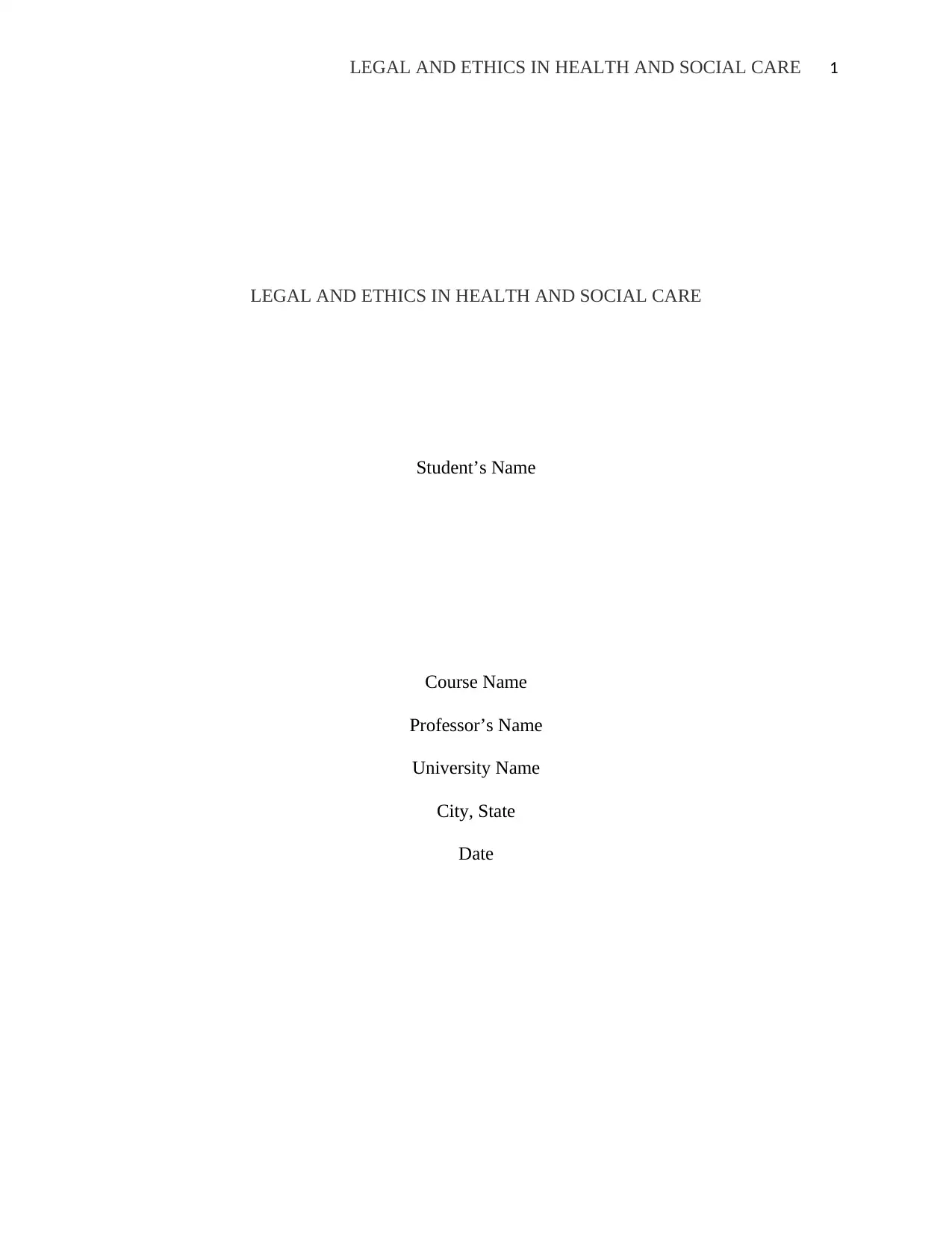
LEGAL AND ETHICS IN HEALTH AND SOCIAL CARE 1
LEGAL AND ETHICS IN HEALTH AND SOCIAL CARE
Student’s Name
Course Name
Professor’s Name
University Name
City, State
Date
LEGAL AND ETHICS IN HEALTH AND SOCIAL CARE
Student’s Name
Course Name
Professor’s Name
University Name
City, State
Date
Paraphrase This Document
Need a fresh take? Get an instant paraphrase of this document with our AI Paraphraser
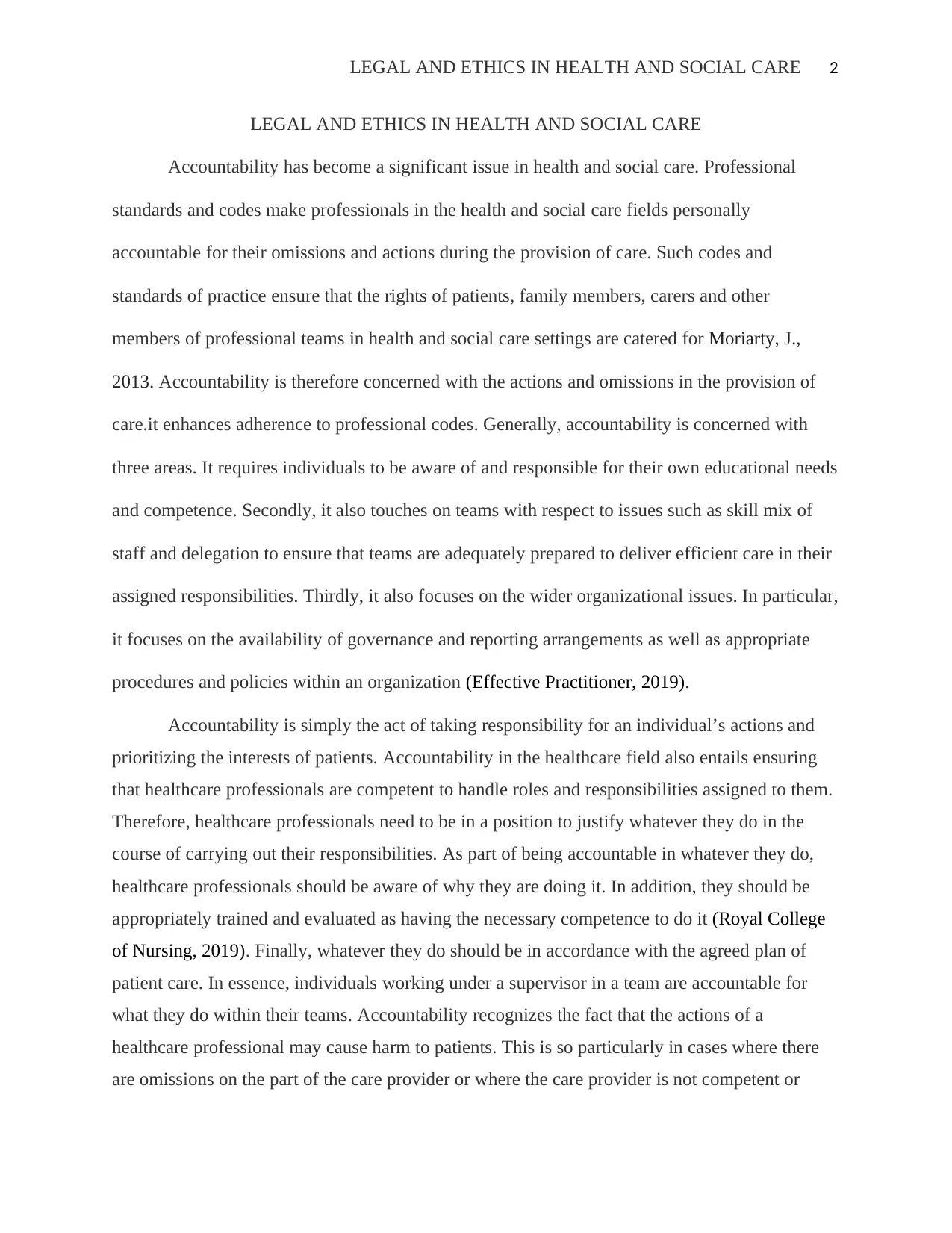
LEGAL AND ETHICS IN HEALTH AND SOCIAL CARE 2
LEGAL AND ETHICS IN HEALTH AND SOCIAL CARE
Accountability has become a significant issue in health and social care. Professional
standards and codes make professionals in the health and social care fields personally
accountable for their omissions and actions during the provision of care. Such codes and
standards of practice ensure that the rights of patients, family members, carers and other
members of professional teams in health and social care settings are catered for Moriarty, J.,
2013. Accountability is therefore concerned with the actions and omissions in the provision of
care.it enhances adherence to professional codes. Generally, accountability is concerned with
three areas. It requires individuals to be aware of and responsible for their own educational needs
and competence. Secondly, it also touches on teams with respect to issues such as skill mix of
staff and delegation to ensure that teams are adequately prepared to deliver efficient care in their
assigned responsibilities. Thirdly, it also focuses on the wider organizational issues. In particular,
it focuses on the availability of governance and reporting arrangements as well as appropriate
procedures and policies within an organization (Effective Practitioner, 2019).
Accountability is simply the act of taking responsibility for an individual’s actions and
prioritizing the interests of patients. Accountability in the healthcare field also entails ensuring
that healthcare professionals are competent to handle roles and responsibilities assigned to them.
Therefore, healthcare professionals need to be in a position to justify whatever they do in the
course of carrying out their responsibilities. As part of being accountable in whatever they do,
healthcare professionals should be aware of why they are doing it. In addition, they should be
appropriately trained and evaluated as having the necessary competence to do it (Royal College
of Nursing, 2019). Finally, whatever they do should be in accordance with the agreed plan of
patient care. In essence, individuals working under a supervisor in a team are accountable for
what they do within their teams. Accountability recognizes the fact that the actions of a
healthcare professional may cause harm to patients. This is so particularly in cases where there
are omissions on the part of the care provider or where the care provider is not competent or
LEGAL AND ETHICS IN HEALTH AND SOCIAL CARE
Accountability has become a significant issue in health and social care. Professional
standards and codes make professionals in the health and social care fields personally
accountable for their omissions and actions during the provision of care. Such codes and
standards of practice ensure that the rights of patients, family members, carers and other
members of professional teams in health and social care settings are catered for Moriarty, J.,
2013. Accountability is therefore concerned with the actions and omissions in the provision of
care.it enhances adherence to professional codes. Generally, accountability is concerned with
three areas. It requires individuals to be aware of and responsible for their own educational needs
and competence. Secondly, it also touches on teams with respect to issues such as skill mix of
staff and delegation to ensure that teams are adequately prepared to deliver efficient care in their
assigned responsibilities. Thirdly, it also focuses on the wider organizational issues. In particular,
it focuses on the availability of governance and reporting arrangements as well as appropriate
procedures and policies within an organization (Effective Practitioner, 2019).
Accountability is simply the act of taking responsibility for an individual’s actions and
prioritizing the interests of patients. Accountability in the healthcare field also entails ensuring
that healthcare professionals are competent to handle roles and responsibilities assigned to them.
Therefore, healthcare professionals need to be in a position to justify whatever they do in the
course of carrying out their responsibilities. As part of being accountable in whatever they do,
healthcare professionals should be aware of why they are doing it. In addition, they should be
appropriately trained and evaluated as having the necessary competence to do it (Royal College
of Nursing, 2019). Finally, whatever they do should be in accordance with the agreed plan of
patient care. In essence, individuals working under a supervisor in a team are accountable for
what they do within their teams. Accountability recognizes the fact that the actions of a
healthcare professional may cause harm to patients. This is so particularly in cases where there
are omissions on the part of the care provider or where the care provider is not competent or
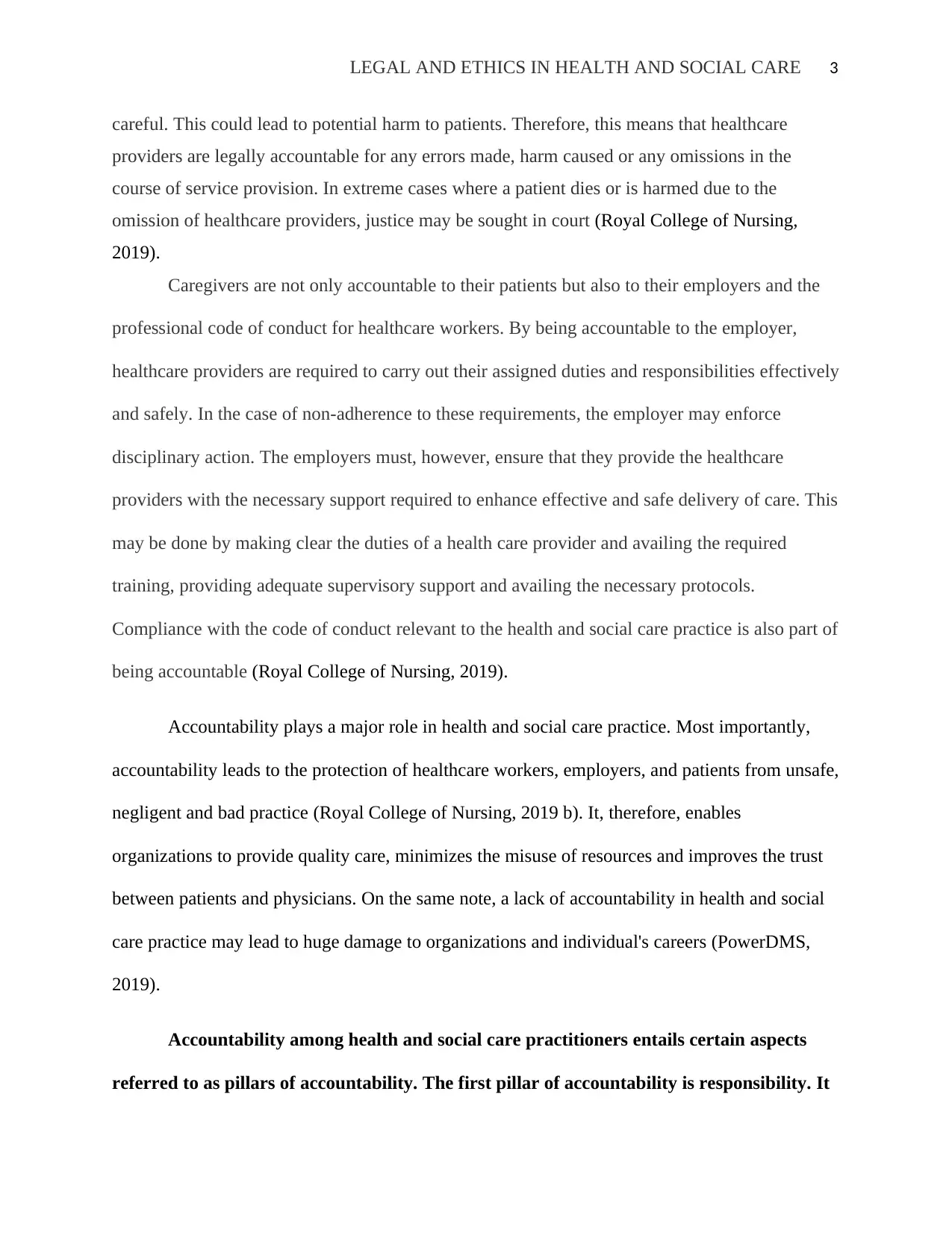
LEGAL AND ETHICS IN HEALTH AND SOCIAL CARE 3
careful. This could lead to potential harm to patients. Therefore, this means that healthcare
providers are legally accountable for any errors made, harm caused or any omissions in the
course of service provision. In extreme cases where a patient dies or is harmed due to the
omission of healthcare providers, justice may be sought in court (Royal College of Nursing,
2019).
Caregivers are not only accountable to their patients but also to their employers and the
professional code of conduct for healthcare workers. By being accountable to the employer,
healthcare providers are required to carry out their assigned duties and responsibilities effectively
and safely. In the case of non-adherence to these requirements, the employer may enforce
disciplinary action. The employers must, however, ensure that they provide the healthcare
providers with the necessary support required to enhance effective and safe delivery of care. This
may be done by making clear the duties of a health care provider and availing the required
training, providing adequate supervisory support and availing the necessary protocols.
Compliance with the code of conduct relevant to the health and social care practice is also part of
being accountable (Royal College of Nursing, 2019).
Accountability plays a major role in health and social care practice. Most importantly,
accountability leads to the protection of healthcare workers, employers, and patients from unsafe,
negligent and bad practice (Royal College of Nursing, 2019 b). It, therefore, enables
organizations to provide quality care, minimizes the misuse of resources and improves the trust
between patients and physicians. On the same note, a lack of accountability in health and social
care practice may lead to huge damage to organizations and individual's careers (PowerDMS,
2019).
Accountability among health and social care practitioners entails certain aspects
referred to as pillars of accountability. The first pillar of accountability is responsibility. It
careful. This could lead to potential harm to patients. Therefore, this means that healthcare
providers are legally accountable for any errors made, harm caused or any omissions in the
course of service provision. In extreme cases where a patient dies or is harmed due to the
omission of healthcare providers, justice may be sought in court (Royal College of Nursing,
2019).
Caregivers are not only accountable to their patients but also to their employers and the
professional code of conduct for healthcare workers. By being accountable to the employer,
healthcare providers are required to carry out their assigned duties and responsibilities effectively
and safely. In the case of non-adherence to these requirements, the employer may enforce
disciplinary action. The employers must, however, ensure that they provide the healthcare
providers with the necessary support required to enhance effective and safe delivery of care. This
may be done by making clear the duties of a health care provider and availing the required
training, providing adequate supervisory support and availing the necessary protocols.
Compliance with the code of conduct relevant to the health and social care practice is also part of
being accountable (Royal College of Nursing, 2019).
Accountability plays a major role in health and social care practice. Most importantly,
accountability leads to the protection of healthcare workers, employers, and patients from unsafe,
negligent and bad practice (Royal College of Nursing, 2019 b). It, therefore, enables
organizations to provide quality care, minimizes the misuse of resources and improves the trust
between patients and physicians. On the same note, a lack of accountability in health and social
care practice may lead to huge damage to organizations and individual's careers (PowerDMS,
2019).
Accountability among health and social care practitioners entails certain aspects
referred to as pillars of accountability. The first pillar of accountability is responsibility. It
⊘ This is a preview!⊘
Do you want full access?
Subscribe today to unlock all pages.

Trusted by 1+ million students worldwide
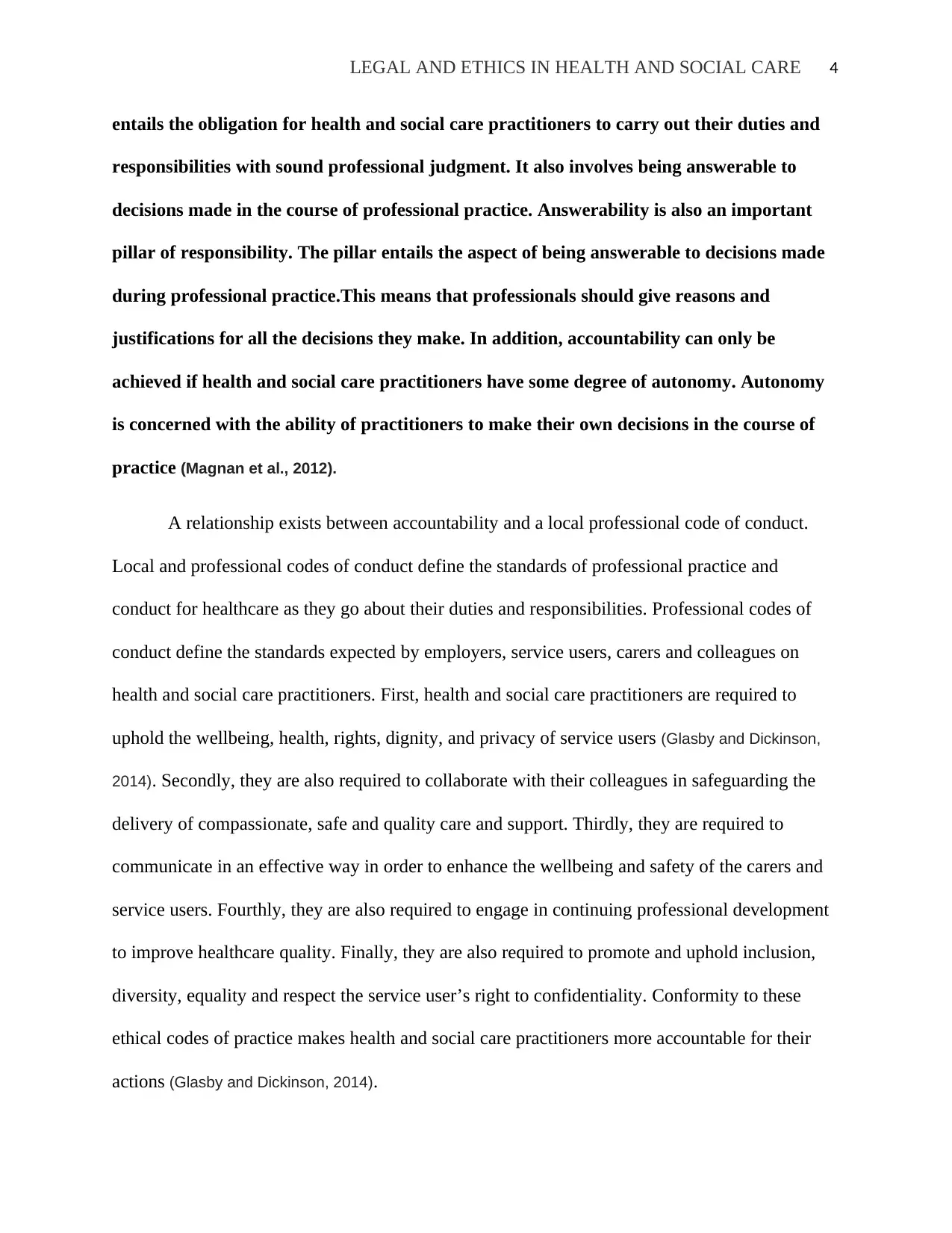
LEGAL AND ETHICS IN HEALTH AND SOCIAL CARE 4
entails the obligation for health and social care practitioners to carry out their duties and
responsibilities with sound professional judgment. It also involves being answerable to
decisions made in the course of professional practice. Answerability is also an important
pillar of responsibility. The pillar entails the aspect of being answerable to decisions made
during professional practice.This means that professionals should give reasons and
justifications for all the decisions they make. In addition, accountability can only be
achieved if health and social care practitioners have some degree of autonomy. Autonomy
is concerned with the ability of practitioners to make their own decisions in the course of
practice (Magnan et al., 2012).
A relationship exists between accountability and a local professional code of conduct.
Local and professional codes of conduct define the standards of professional practice and
conduct for healthcare as they go about their duties and responsibilities. Professional codes of
conduct define the standards expected by employers, service users, carers and colleagues on
health and social care practitioners. First, health and social care practitioners are required to
uphold the wellbeing, health, rights, dignity, and privacy of service users (Glasby and Dickinson,
2014). Secondly, they are also required to collaborate with their colleagues in safeguarding the
delivery of compassionate, safe and quality care and support. Thirdly, they are required to
communicate in an effective way in order to enhance the wellbeing and safety of the carers and
service users. Fourthly, they are also required to engage in continuing professional development
to improve healthcare quality. Finally, they are also required to promote and uphold inclusion,
diversity, equality and respect the service user’s right to confidentiality. Conformity to these
ethical codes of practice makes health and social care practitioners more accountable for their
actions (Glasby and Dickinson, 2014).
entails the obligation for health and social care practitioners to carry out their duties and
responsibilities with sound professional judgment. It also involves being answerable to
decisions made in the course of professional practice. Answerability is also an important
pillar of responsibility. The pillar entails the aspect of being answerable to decisions made
during professional practice.This means that professionals should give reasons and
justifications for all the decisions they make. In addition, accountability can only be
achieved if health and social care practitioners have some degree of autonomy. Autonomy
is concerned with the ability of practitioners to make their own decisions in the course of
practice (Magnan et al., 2012).
A relationship exists between accountability and a local professional code of conduct.
Local and professional codes of conduct define the standards of professional practice and
conduct for healthcare as they go about their duties and responsibilities. Professional codes of
conduct define the standards expected by employers, service users, carers and colleagues on
health and social care practitioners. First, health and social care practitioners are required to
uphold the wellbeing, health, rights, dignity, and privacy of service users (Glasby and Dickinson,
2014). Secondly, they are also required to collaborate with their colleagues in safeguarding the
delivery of compassionate, safe and quality care and support. Thirdly, they are required to
communicate in an effective way in order to enhance the wellbeing and safety of the carers and
service users. Fourthly, they are also required to engage in continuing professional development
to improve healthcare quality. Finally, they are also required to promote and uphold inclusion,
diversity, equality and respect the service user’s right to confidentiality. Conformity to these
ethical codes of practice makes health and social care practitioners more accountable for their
actions (Glasby and Dickinson, 2014).
Paraphrase This Document
Need a fresh take? Get an instant paraphrase of this document with our AI Paraphraser
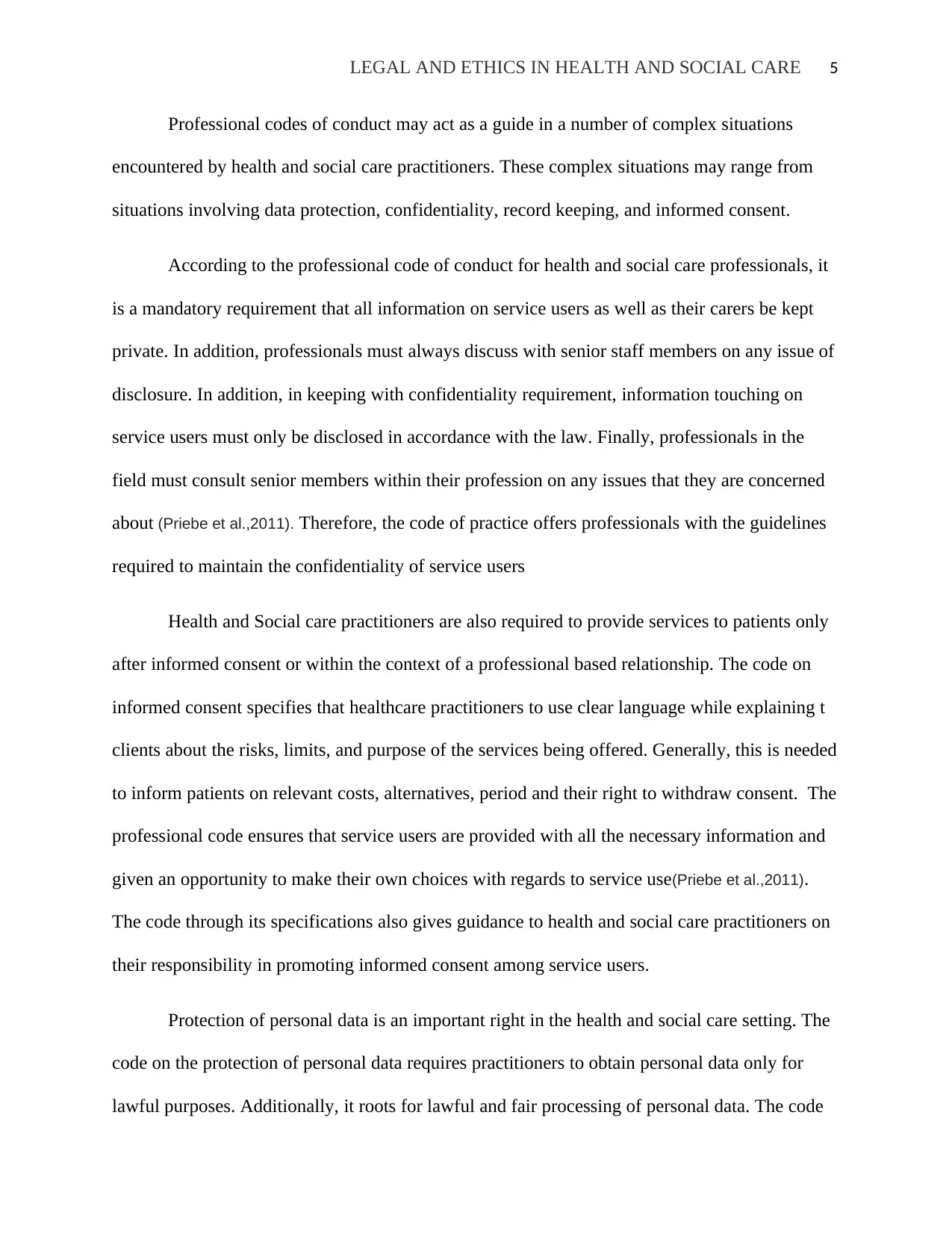
LEGAL AND ETHICS IN HEALTH AND SOCIAL CARE 5
Professional codes of conduct may act as a guide in a number of complex situations
encountered by health and social care practitioners. These complex situations may range from
situations involving data protection, confidentiality, record keeping, and informed consent.
According to the professional code of conduct for health and social care professionals, it
is a mandatory requirement that all information on service users as well as their carers be kept
private. In addition, professionals must always discuss with senior staff members on any issue of
disclosure. In addition, in keeping with confidentiality requirement, information touching on
service users must only be disclosed in accordance with the law. Finally, professionals in the
field must consult senior members within their profession on any issues that they are concerned
about (Priebe et al.,2011). Therefore, the code of practice offers professionals with the guidelines
required to maintain the confidentiality of service users
Health and Social care practitioners are also required to provide services to patients only
after informed consent or within the context of a professional based relationship. The code on
informed consent specifies that healthcare practitioners to use clear language while explaining t
clients about the risks, limits, and purpose of the services being offered. Generally, this is needed
to inform patients on relevant costs, alternatives, period and their right to withdraw consent. The
professional code ensures that service users are provided with all the necessary information and
given an opportunity to make their own choices with regards to service use(Priebe et al.,2011).
The code through its specifications also gives guidance to health and social care practitioners on
their responsibility in promoting informed consent among service users.
Protection of personal data is an important right in the health and social care setting. The
code on the protection of personal data requires practitioners to obtain personal data only for
lawful purposes. Additionally, it roots for lawful and fair processing of personal data. The code
Professional codes of conduct may act as a guide in a number of complex situations
encountered by health and social care practitioners. These complex situations may range from
situations involving data protection, confidentiality, record keeping, and informed consent.
According to the professional code of conduct for health and social care professionals, it
is a mandatory requirement that all information on service users as well as their carers be kept
private. In addition, professionals must always discuss with senior staff members on any issue of
disclosure. In addition, in keeping with confidentiality requirement, information touching on
service users must only be disclosed in accordance with the law. Finally, professionals in the
field must consult senior members within their profession on any issues that they are concerned
about (Priebe et al.,2011). Therefore, the code of practice offers professionals with the guidelines
required to maintain the confidentiality of service users
Health and Social care practitioners are also required to provide services to patients only
after informed consent or within the context of a professional based relationship. The code on
informed consent specifies that healthcare practitioners to use clear language while explaining t
clients about the risks, limits, and purpose of the services being offered. Generally, this is needed
to inform patients on relevant costs, alternatives, period and their right to withdraw consent. The
professional code ensures that service users are provided with all the necessary information and
given an opportunity to make their own choices with regards to service use(Priebe et al.,2011).
The code through its specifications also gives guidance to health and social care practitioners on
their responsibility in promoting informed consent among service users.
Protection of personal data is an important right in the health and social care setting. The
code on the protection of personal data requires practitioners to obtain personal data only for
lawful purposes. Additionally, it roots for lawful and fair processing of personal data. The code
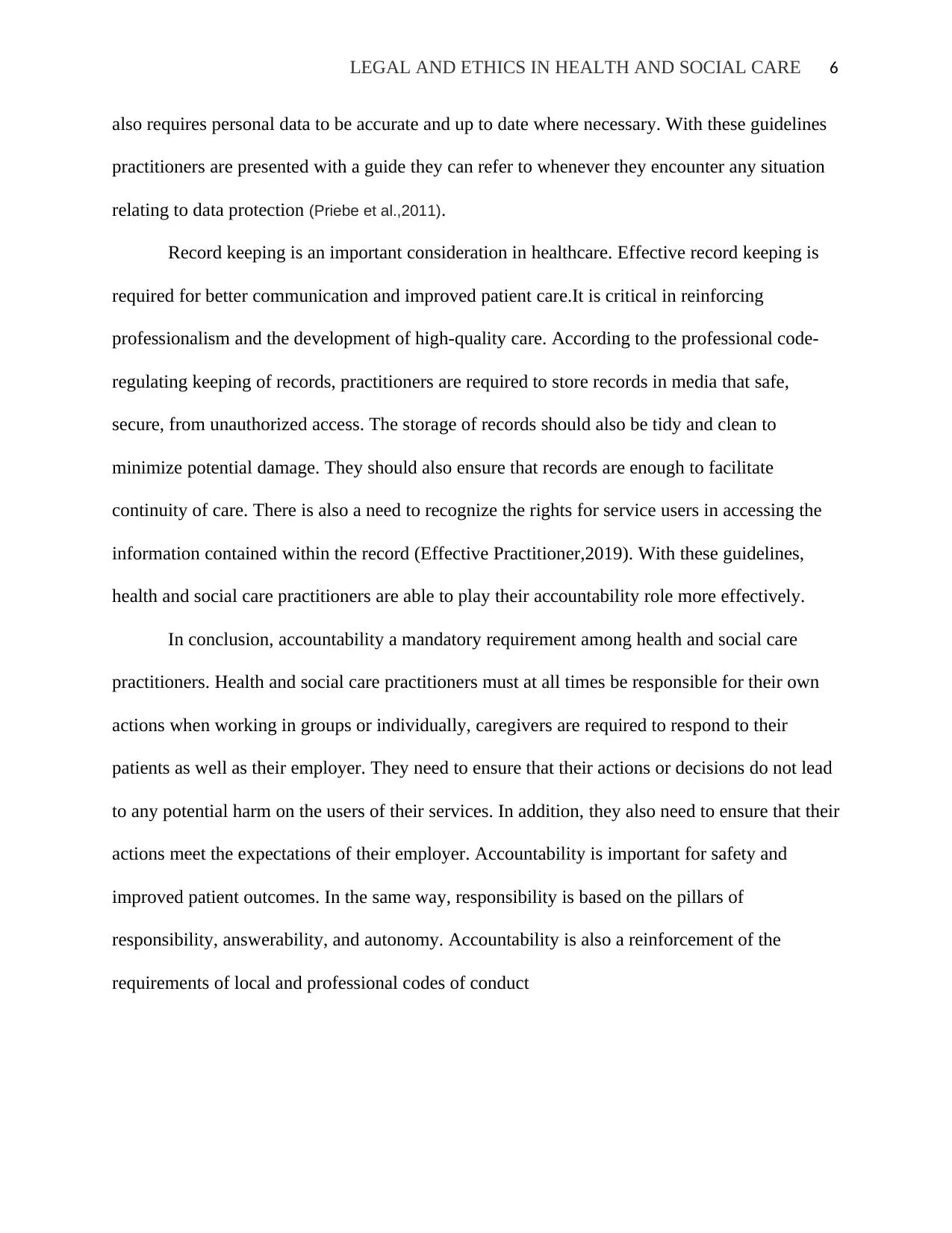
LEGAL AND ETHICS IN HEALTH AND SOCIAL CARE 6
also requires personal data to be accurate and up to date where necessary. With these guidelines
practitioners are presented with a guide they can refer to whenever they encounter any situation
relating to data protection (Priebe et al.,2011).
Record keeping is an important consideration in healthcare. Effective record keeping is
required for better communication and improved patient care.It is critical in reinforcing
professionalism and the development of high-quality care. According to the professional code-
regulating keeping of records, practitioners are required to store records in media that safe,
secure, from unauthorized access. The storage of records should also be tidy and clean to
minimize potential damage. They should also ensure that records are enough to facilitate
continuity of care. There is also a need to recognize the rights for service users in accessing the
information contained within the record (Effective Practitioner,2019). With these guidelines,
health and social care practitioners are able to play their accountability role more effectively.
In conclusion, accountability a mandatory requirement among health and social care
practitioners. Health and social care practitioners must at all times be responsible for their own
actions when working in groups or individually, caregivers are required to respond to their
patients as well as their employer. They need to ensure that their actions or decisions do not lead
to any potential harm on the users of their services. In addition, they also need to ensure that their
actions meet the expectations of their employer. Accountability is important for safety and
improved patient outcomes. In the same way, responsibility is based on the pillars of
responsibility, answerability, and autonomy. Accountability is also a reinforcement of the
requirements of local and professional codes of conduct
also requires personal data to be accurate and up to date where necessary. With these guidelines
practitioners are presented with a guide they can refer to whenever they encounter any situation
relating to data protection (Priebe et al.,2011).
Record keeping is an important consideration in healthcare. Effective record keeping is
required for better communication and improved patient care.It is critical in reinforcing
professionalism and the development of high-quality care. According to the professional code-
regulating keeping of records, practitioners are required to store records in media that safe,
secure, from unauthorized access. The storage of records should also be tidy and clean to
minimize potential damage. They should also ensure that records are enough to facilitate
continuity of care. There is also a need to recognize the rights for service users in accessing the
information contained within the record (Effective Practitioner,2019). With these guidelines,
health and social care practitioners are able to play their accountability role more effectively.
In conclusion, accountability a mandatory requirement among health and social care
practitioners. Health and social care practitioners must at all times be responsible for their own
actions when working in groups or individually, caregivers are required to respond to their
patients as well as their employer. They need to ensure that their actions or decisions do not lead
to any potential harm on the users of their services. In addition, they also need to ensure that their
actions meet the expectations of their employer. Accountability is important for safety and
improved patient outcomes. In the same way, responsibility is based on the pillars of
responsibility, answerability, and autonomy. Accountability is also a reinforcement of the
requirements of local and professional codes of conduct
⊘ This is a preview!⊘
Do you want full access?
Subscribe today to unlock all pages.

Trusted by 1+ million students worldwide
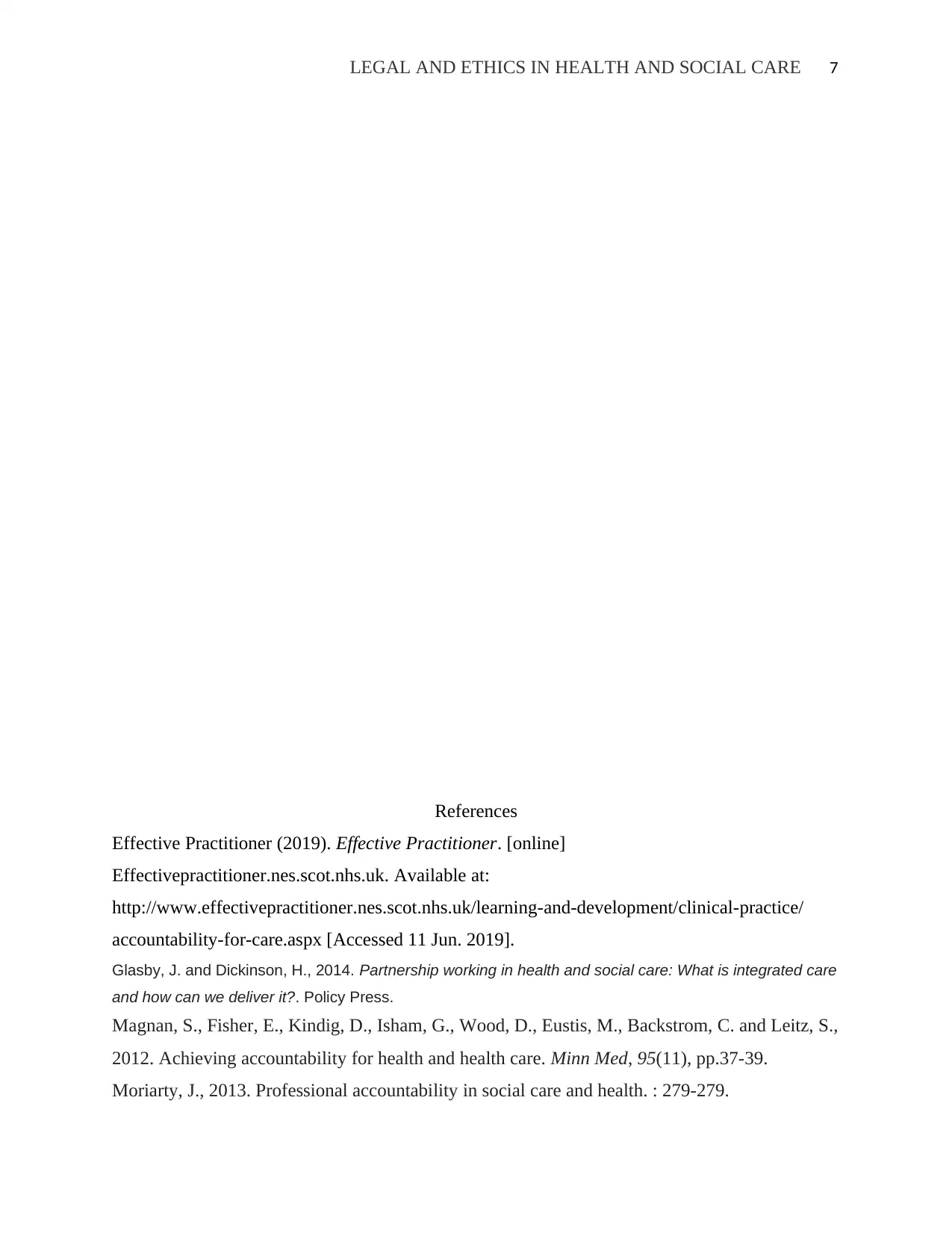
LEGAL AND ETHICS IN HEALTH AND SOCIAL CARE 7
References
Effective Practitioner (2019). Effective Practitioner. [online]
Effectivepractitioner.nes.scot.nhs.uk. Available at:
http://www.effectivepractitioner.nes.scot.nhs.uk/learning-and-development/clinical-practice/
accountability-for-care.aspx [Accessed 11 Jun. 2019].
Glasby, J. and Dickinson, H., 2014. Partnership working in health and social care: What is integrated care
and how can we deliver it?. Policy Press.
Magnan, S., Fisher, E., Kindig, D., Isham, G., Wood, D., Eustis, M., Backstrom, C. and Leitz, S.,
2012. Achieving accountability for health and health care. Minn Med, 95(11), pp.37-39.
Moriarty, J., 2013. Professional accountability in social care and health. : 279-279.
References
Effective Practitioner (2019). Effective Practitioner. [online]
Effectivepractitioner.nes.scot.nhs.uk. Available at:
http://www.effectivepractitioner.nes.scot.nhs.uk/learning-and-development/clinical-practice/
accountability-for-care.aspx [Accessed 11 Jun. 2019].
Glasby, J. and Dickinson, H., 2014. Partnership working in health and social care: What is integrated care
and how can we deliver it?. Policy Press.
Magnan, S., Fisher, E., Kindig, D., Isham, G., Wood, D., Eustis, M., Backstrom, C. and Leitz, S.,
2012. Achieving accountability for health and health care. Minn Med, 95(11), pp.37-39.
Moriarty, J., 2013. Professional accountability in social care and health. : 279-279.
Paraphrase This Document
Need a fresh take? Get an instant paraphrase of this document with our AI Paraphraser
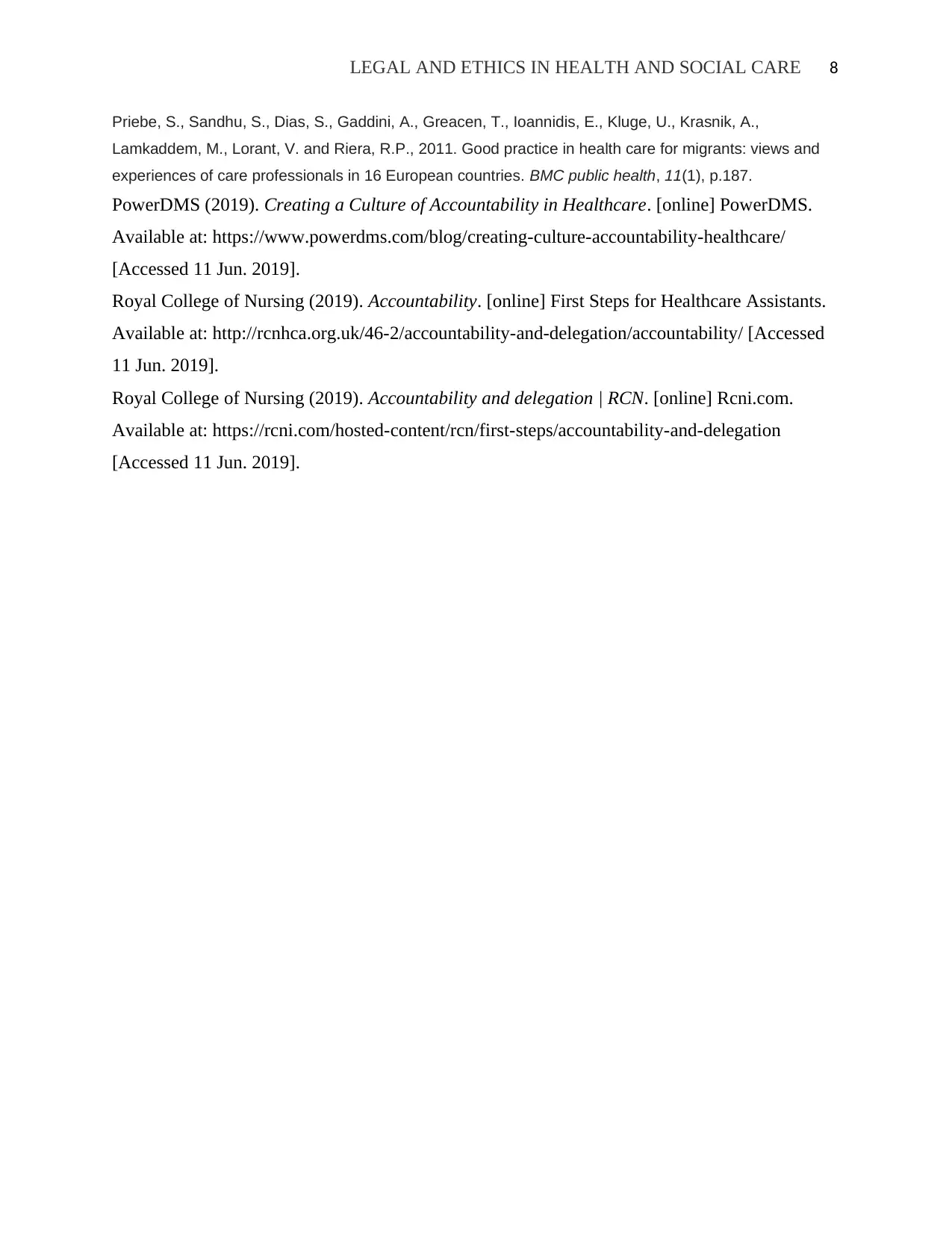
LEGAL AND ETHICS IN HEALTH AND SOCIAL CARE 8
Priebe, S., Sandhu, S., Dias, S., Gaddini, A., Greacen, T., Ioannidis, E., Kluge, U., Krasnik, A.,
Lamkaddem, M., Lorant, V. and Riera, R.P., 2011. Good practice in health care for migrants: views and
experiences of care professionals in 16 European countries. BMC public health, 11(1), p.187.
PowerDMS (2019). Creating a Culture of Accountability in Healthcare. [online] PowerDMS.
Available at: https://www.powerdms.com/blog/creating-culture-accountability-healthcare/
[Accessed 11 Jun. 2019].
Royal College of Nursing (2019). Accountability. [online] First Steps for Healthcare Assistants.
Available at: http://rcnhca.org.uk/46-2/accountability-and-delegation/accountability/ [Accessed
11 Jun. 2019].
Royal College of Nursing (2019). Accountability and delegation | RCN. [online] Rcni.com.
Available at: https://rcni.com/hosted-content/rcn/first-steps/accountability-and-delegation
[Accessed 11 Jun. 2019].
Priebe, S., Sandhu, S., Dias, S., Gaddini, A., Greacen, T., Ioannidis, E., Kluge, U., Krasnik, A.,
Lamkaddem, M., Lorant, V. and Riera, R.P., 2011. Good practice in health care for migrants: views and
experiences of care professionals in 16 European countries. BMC public health, 11(1), p.187.
PowerDMS (2019). Creating a Culture of Accountability in Healthcare. [online] PowerDMS.
Available at: https://www.powerdms.com/blog/creating-culture-accountability-healthcare/
[Accessed 11 Jun. 2019].
Royal College of Nursing (2019). Accountability. [online] First Steps for Healthcare Assistants.
Available at: http://rcnhca.org.uk/46-2/accountability-and-delegation/accountability/ [Accessed
11 Jun. 2019].
Royal College of Nursing (2019). Accountability and delegation | RCN. [online] Rcni.com.
Available at: https://rcni.com/hosted-content/rcn/first-steps/accountability-and-delegation
[Accessed 11 Jun. 2019].
1 out of 8
Related Documents
Your All-in-One AI-Powered Toolkit for Academic Success.
+13062052269
info@desklib.com
Available 24*7 on WhatsApp / Email
![[object Object]](/_next/static/media/star-bottom.7253800d.svg)
Unlock your academic potential
Copyright © 2020–2026 A2Z Services. All Rights Reserved. Developed and managed by ZUCOL.




